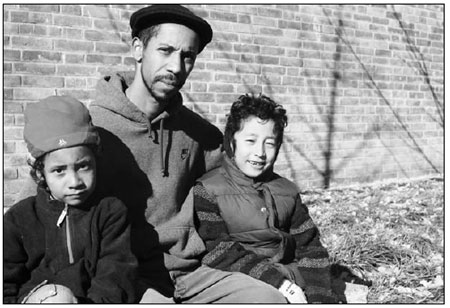Profiles
English teacher finds his way through the Tao
By David Cohen (China Daily)
Updated: 2010-11-21 10:32
 |
Large Medium Small |
 |
|
Che Garcia practices with a pair of weapons he had specially made, based on an old design his tai chi master described. [Photo by Mike Peters / China Daily] |
Che Garcia is telling the story of the first time he encountered Chinese culture in person, as an exchange student in Taiwan. The Taiwanese university pulled out of the program, and he lost half his funding and his dormitory and wound up staying with friends of friends - who turned out to be running an opium den out of their apartment - and, eventually, semi-homeless for three months, spending his days reading at the public library. And he interrupts himself, asking, "Can we get back to the Tao?"
| ||||
Garcia is a serious student of tai chi. Speaking of his devotion to his teacher and the traditional martial art, he compares himself to a cult member.
"It's a serious commitment to a person, a lineage, the group," he says. "You give your life to something."
His training certainly is not limited to the relaxing movements widely associated with tai chi in the West.
Garcia said he meets his teacher at midnight when he's busy, practicing outdoors in a public park until 4 am even in the dead of winter. Even when it snows, he said, he has to carry extra T-shirts to deal with the sweat.
On a recent windy Saturday, he's demonstrating forms for a pair of journalists, shivering in winter coats and gloves. Clad in a sweatshirt and light cotton pants, he doesn't flinch as he moves through a new routine with a rare weapon called the shuang tai ji tu, or double tai-chi diagram, a pair of octagon-headed maces printed with the yin-yang symbol. Garcia had the unusual weapons custom-made from scrap metal, based on his teacher's memory of his own early weapons.
Garcia says that his relationship with his teacher, an elderly retiree named Wang Dianzhen, is no less intense than his training. Wang has never been a professional teacher - he practiced tai chi and Beijing opera singing during his spare time - and now he has only one student, and a few "disciples".
"I'm a better husband because of him," Garcia says. "I'm a better father because of him."
Garcia said he turns to his elderly teacher for advice about all matters - work, parenting, even visa issues. When they meet, he says, Wang sometimes just tells him stories.
But Garcia doesn't really want to talk about his own life. He wants to talk about the Tao, a metaphysical philosophy that has become part of some of the religions that followed it. Tao is intrinsically related to the concepts yin and yang, and seeking balance between logical and emotional life. Tao teaches that every action creates unavoidable counter-actions, and practitioners work to accept or work with these natural developments.
"I've been spiritual-minded since I was young," he said. In high school, he studied the Bible, and then yoga.
 |
|
Garcia's morning workouts in the park often include his two oldest sons, who are learning tai chi, too. [Photo by Mike Peters / China Daily] |
Garcia says he first discovered Taoism at college in America, and he gave himself a Taoist education during his days reading at the library in Taipei. It's drawn him back to China every time he's gone home; tai chi is fundamentally his way to study the Tao.
"Tai chi comes from the I Ching," Garcia says, referring to a Chinese classic on divination. "So I can pretty much find something in common with any kind of artist, chef or calligrapher.
He studied tai chi during a decade teaching English in Shandong and Guangzhou, before he moved to Beijing in 2004. Taoism can be a religion, Garcia says, but for him it's closer to a philosophy.
Chiefly, he says, Taoism is about the rejection of dichotomy, based on the ancient philosopher Zhuang Zi's dismissal of the efforts of other philosophies to distinguish between physical things and transcendent reality, and his belief that "There's not really anything to strive for, to live is the point".
"Some people say the glass is half full, half empty. But the Taoist says it doesn't really matter, the glass is completely full, half air, half water."
But more important, Garcia says, is Lao Zi, a frequently paradoxical philosopher traditionally considered the founder of Taoism, baffling to many modern readers.
"Lao Zi's like Benny Goodman or someone, you gotta know all his tunes if you want to jam," he said. "I actually started using Lao Zi's philosophy to raise my kids, and it worked pretty well."
He's already teaching tai chi to the oldest of his four children, 6 and 7 years old.
"Lao Zi is about the inherent qualities of things, so it helps me kind of to be myself in a Chinese context."
In the end, Garcia said, he thinks he may return to the US, but he won't give up tai chi.
He doesn't know whether he'll become a tai chi master and take students of his own.
Would he like to set up a school in America?
"I wanted to," he says, "but now Americans don't have any money to pay me to teach them."



